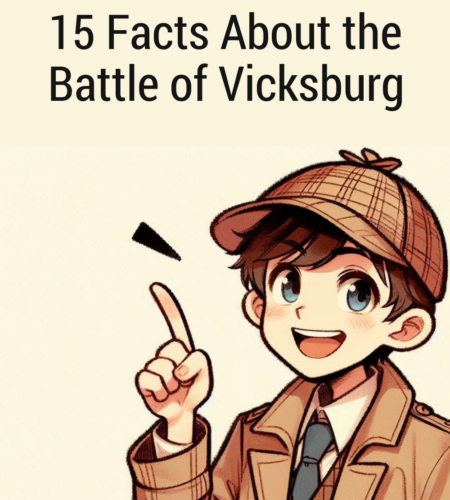The Battle of Vicksburg is one of the defining moments in American Civil War history. This epic clash took place from May 18 to July 4, 1863, and it was a turning point that would have a lasting impact on the outcome of the war. Situated on the Mississippi River, Vicksburg, Mississippi, was a strategic stronghold that both the Union and the Confederacy desperately wanted to control. In this article, we’ll delve into 15 fascinating facts about the Battle of Vicksburg that shed light on the events, key players, and the significance of this historic battle.
Fact 1: The Lengthy Siege
- A 47-Day Standoff: The Battle of Vicksburg was not a quick skirmish. It was a protracted siege that lasted for 47 days. Union forces, led by General Ulysses S. Grant, surrounded the city, leading to a grueling and determined struggle.
- Cutting Off Supplies: Grant’s strategy was to cut off Vicksburg from the outside world. He blocked the city’s access to the Mississippi River, which effectively trapped the Confederate forces inside.
- Starvation and Surrender: The lengthy siege led to severe shortages of food and supplies for the Confederate defenders. Eventually, on July 4, 1863, Vicksburg surrendered, marking a significant victory for the Union.
Fact 2: The Importance of Vicksburg
- Control of the Mississippi River: Vicksburg’s location on the Mississippi River made it a crucial piece in the puzzle of the Civil War. Whoever controlled Vicksburg had a strong advantage in controlling the flow of supplies and troops on this vital waterway.
- Splitting the Confederacy: Capturing Vicksburg was part of a broader Union strategy to split the Confederacy in two. With Vicksburg under Union control, the South was effectively divided, making it harder for Confederate forces to coordinate.
- Symbolic Victory: The fall of Vicksburg was seen as a turning point in the war. It boosted Union morale and weakened the Confederacy’s resolve.
Fact 3: The Siege of Jackson
- Grant’s Dual Offensive: While besieging Vicksburg, General Grant also launched an offensive against the nearby city of Jackson, Mississippi, on May 14, 1863.
- Diversionary Tactic: The attack on Jackson was meant to divert Confederate reinforcements away from Vicksburg, further isolating the city.
- Capture of Jackson: Union forces successfully captured Jackson on May 14, giving them a strategic base of operations for the siege of Vicksburg.
Fact 4: Pemberton’s Dilemma
- John C. Pemberton: Confederate General John C. Pemberton was tasked with defending Vicksburg. The situation he faced was incredibly challenging.
- Lack of Reinforcements: Pemberton struggled with insufficient supplies and a lack of reinforcements from Confederate leadership, leaving him with limited options.
- The Unenviable Choice: With no clear way to break the siege or relieve his starving men, Pemberton faced the difficult decision of surrendering Vicksburg to General Grant.
Fact 5: Underground Explosions
- Tunnels and Mines: To break the Union siege, Confederate soldiers dug tunnels beneath the city’s defenses and planted explosives.
- The Battle of the Crater: On June 25, 1863, one of these tunnels exploded beneath Union lines. However, the explosion was not as effective as hoped, and Union forces quickly regrouped.
- Failed Gambit: The explosion became known as the “Battle of the Crater” and was a failed attempt to break the siege. It only added to the misery of the Confederate defenders.
Fact 6: Starvation Rations
- Desperate Measures: As the siege dragged on, the Confederate defenders were reduced to eating mules, dogs, and even rats to survive.
- Limited Food Supplies: Food shortages became so dire that Confederate soldiers were surviving on meager rations, and disease was rampant.
- The Final Surrender: The desperate situation, with no relief in sight, ultimately forced the surrender of Vicksburg on Independence Day, 1863.
Fact 7: Union Victory Salutes
- 17-Gun Salute: On the day of Vicksburg’s surrender, Union forces fired a 17-gun salute to celebrate their victory.
- Symbolic Gesture: The number 17 was chosen to represent the 17 Confederate states, symbolizing the Union’s triumph over the secessionists.
- Differing Views: This gesture was a source of great controversy, as many Confederate defenders saw it as a painful and unnecessary insult.
Fact 8: July 4th Independence Day
- Double Celebration: The capture of Vicksburg on July 4th made the day doubly significant for the Union. It was not only Independence Day but also the day they achieved a monumental military victory.
- Boost to Union Morale: The news of Vicksburg’s fall boosted Union morale, as it came on the heels of another significant victory at Gettysburg just a day earlier.
- Turning Tides: The twin victories at Gettysburg and Vicksburg marked a turning point in the Civil War, giving the Union momentum and hope.
Fact 9: The Gibraltar of the Confederacy
- Nickname: Vicksburg was often referred to as the “Gibraltar of the Confederacy” because of its formidable defenses and strategic location.
- Unconquerable Reputation: Before the siege, Vicksburg had never been taken by force. Its reputation for impregnability was well-deserved.
- Changing History: The fall of this once seemingly invincible fortress was a stunning and pivotal moment in American history.
Fact 10: Casualties and Prisoners
- Human Toll: The Battle of Vicksburg resulted in significant casualties. The Union suffered around 4,800 killed and 12,800 wounded, while the Confederates endured approximately 3,300 killed and 27,800 wounded.
- Prisoners of War: With the surrender of Vicksburg, General Pemberton was forced to release nearly 30,000 Confederate prisoners.
- Impact on the South: The loss of Vicksburg and the large number of captured Confederate troops were devastating blows to the Southern war effort.
Fact 11: Vicksburg National Military Park
- Preserving History: In 1899, the Vicksburg National Military Park was established to commemorate the Battle of Vicksburg and its significance in the Civil War.
- Historic Landmarks: The park features numerous monuments, markers, and preserved fortifications, providing visitors with a tangible connection to this historic battle.
- Educational Experience: Today, the park serves as an educational resource and a place of reflection on the turbulent events that unfolded during the Civil War.
Fact 12: The Sherman Connection
- William Tecumseh Sherman: General William Tecumseh Sherman played a significant role in the Vicksburg campaign under General Grant.
- Promotion and Recognition: Sherman’s performance at Vicksburg earned him recognition and a promotion to major general. He would go on to become a key figure in the Union’s victory.
- “March to the Sea”: Sherman’s famous “March to the Sea” during the later stages of the war was influenced by his experiences in the Vicksburg campaign.
Fact 13: Impact on the Mississippi River
- Reopening Trade Routes: The Union’s control of Vicksburg reopened the Mississippi River to trade, which was essential for both military and economic reasons.
- Economic Significance: The victory at Vicksburg allowed Union commerce to flow down the river, significantly impacting the Confederacy’s ability to maintain its war effort.
- Strategic Influence: The Union’s hold on the river also ensured the ability to move troops and supplies more freely, which was a critical factor in the war.
Fact 14: The Anaconda Plan
- Strategic Blueprint: The Union’s plan for winning the Civil War, known as the Anaconda Plan, focused on blockading Southern ports and capturing the Mississippi River, including Vicksburg.
- Slow Squeeze: This plan aimed to strangle the Confederacy slowly, cutting off its resources and limiting its mobility.
- Fulfilling the Plan: The capture of Vicksburg was a significant step toward realizing the goals of the Anaconda Plan and was executed under General Grant’s command.
Fact 15: Post-War Legacy
- Reconstruction Era: After the Civil War, Vicksburg and the surrounding area faced challenges during the Reconstruction era. The city and region would see significant changes in the aftermath of the war.
- Historical Tourism: Vicksburg’s historical significance has made it a destination for history enthusiasts and tourists interested in the Civil War.
- Reflecting on History: The Battle of Vicksburg remains a potent symbol of the sacrifices and struggles that defined the American Civil War and continues to be a subject of historical interest.
Conclusion
The Battle of Vicksburg was a momentous event that showcased the determination, sacrifice, and strategic brilliance of both Union and Confederate forces. Its impact on the course of the Civil War, the South’s morale, and the nation’s history is immeasurable. The fall of Vicksburg marked a pivotal moment, demonstrating that even the most seemingly impregnable strongholds could be brought down by the tenacity and strategy of those who sought to control them. As we reflect on the 15 facts about the Battle of Vicksburg, we gain a deeper understanding of its historical significance and the profound effects it had on the United States.
Subscribe to our email newsletter to get the latest posts delivered right to your email.





Comments